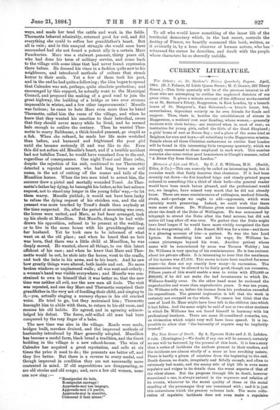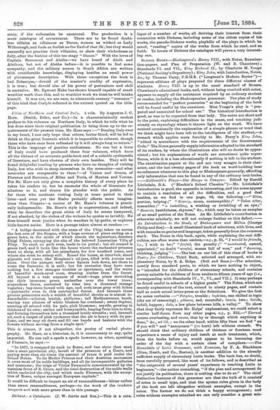The New Dance of Death. By A. Egmont Hake and
J. G. Lefebre. 3 vols. (Remington.)—We doubt if any one will be amused, certainly no one will be bettered, by the perusal of this book. It is less eatery than a series of incidents the authors present to their readers, and the incidents are almost wholly of a more or less revolting nature. There is hardly a gleam of sunshine from the beginning to the end. Death dances, no doubt, irregularly and fitfully enough, and often to extremely bad music, and the seamy side of high life is even more repulsive and vulgar in its details than the worst aspects of that of the vilest slums. But the progress through life to death, however sensational a one, is always natural in the sequence and relation of its events, whatever be the moral quality of these or the social standing of the personages they are concerned with ; and it is just this naturalness which the present volumes lack. The mere collo- cation of repulsive incidents does not even make a repulsive
story, if the collocation be unnatural. The production is a mere catalogue of occurrences. There are to be fonnd doubt- less villains as villainous as Dacon, women as wicked as Lady Wilborough, and fools as foolish as the Earl of that ilk ; but they would assuredly not practise their villainies, or show their wickedness or folly, after the fashion of this too stagy " Dance." With the loves of Captain Beaumont and Alethe—we have heard of Aleth and Aletbcea, but not of Alethe before—it is possible to feel some sympathy, and the military scenes in South Africa are written with considerable knowledge, displaying besides no small power of picturesque description. With these exceptions the book is bad Zolaesque,—devoid of the master's crudity of expression, it is true ; but devoid also of his power of portraiture and skill in narrative. Mr. Egmont Hake has shown himself capable of much worthier work than this, and to worthier work we trust he will betake himself. It was not, we are sure, to nineteenth-century " romance " of this kind that Carlyle referred in the extract quoted on the title- page.



































 Previous page
Previous page